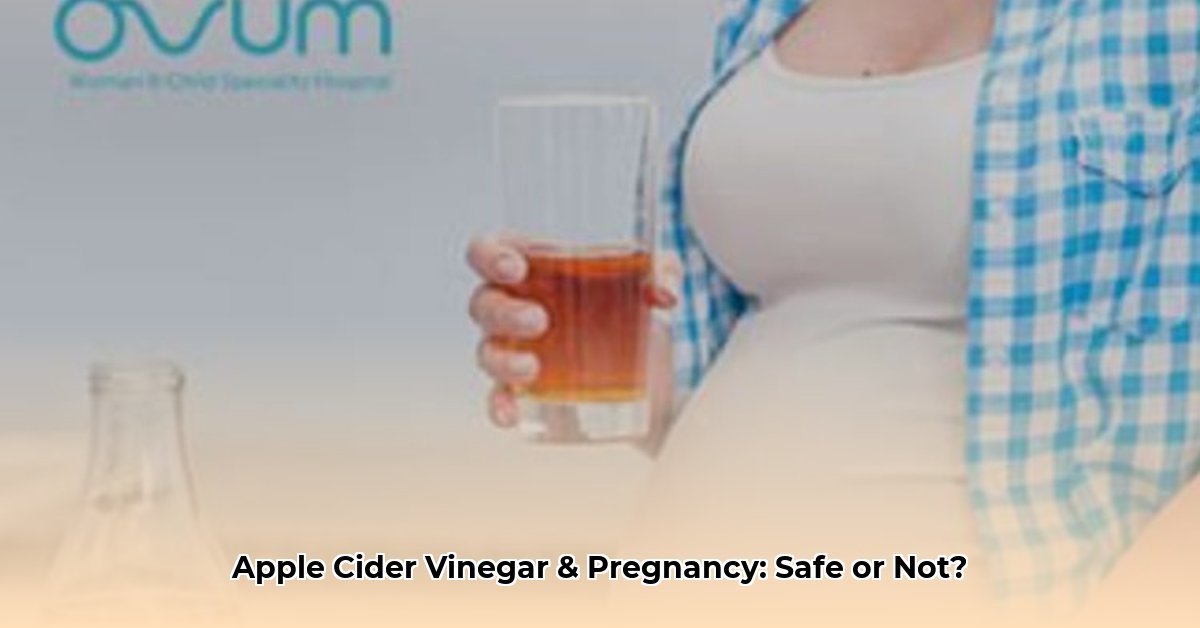Apple cider vinegar (ACV) has gained popularity as a natural remedy for various ailments, and many pregnant women are curious about its potential benefits. While some tout ACV as a pregnancy panacea, it’s crucial to separate fact from fiction. This guide provides evidence-based information to help you make informed decisions about ACV consumption during pregnancy. Always consult your doctor before adding anything new to your diet, especially while expecting.
Debunking the Myths: ACV and Pregnancy
ACV is often hailed as a natural cure-all, but does it live up to the hype, especially during pregnancy? Let’s examine some common claims:
Morning Sickness
Many believe ACV can alleviate morning sickness. The sour taste might seem like it would quell nausea, but scientific evidence supporting this claim is lacking. Ginger, however, has shown promise in studies and may be a more effective natural remedy.
Heartburn
Some suggest ACV can soothe heartburn, while others worry it could exacerbate the problem. The current research is inconclusive. Safer, more established remedies for heartburn during pregnancy include eating smaller, more frequent meals and elevating your head while sleeping.
Blood Sugar Control
Preliminary studies suggest ACV might influence blood sugar levels in non-pregnant individuals. However, its effects during pregnancy, especially concerning gestational diabetes, are unknown. A healthy diet and regular exercise, as advised by your doctor, remain the cornerstones of gestational diabetes management.
Pasteurized vs. Unpasteurized: A Critical Distinction
Not all ACV is created equal. Unpasteurized ACV, often labeled “raw,” can contain harmful bacteria like E. coli, Salmonella, and Listeria, posing significant risks during pregnancy. Pasteurization eliminates these bacteria, making it the only safe choice for expectant mothers.
Safe Usage Guidelines (If Approved by Your Doctor)
Even with pasteurized ACV, moderation is key. If your doctor approves, dilute 1-2 tablespoons in 8 ounces of water, up to twice daily. Undiluted ACV can erode tooth enamel.
Preparing a Diluted ACV Drink
- Fill an 8-ounce glass with water.
- Add 1-2 tablespoons of pasteurized ACV.
- Stir well.
- Sip slowly and rinse your mouth afterward.
| ACV Type | Potential Risks | Possible Benefits (Limited Evidence) | Max Recommended Dosage (Consult Doctor) |
|---|---|---|---|
| Pasteurized | Tooth enamel erosion, possible medication interactions | Might offer some relief from heartburn or morning sickness; May help with blood sugar control | 1-2 tablespoons diluted in water, up to twice daily |
| Unpasteurized | Bacterial contamination (Listeria, Salmonella) | Possible probiotic effects | Not recommended during pregnancy |
Expert Advice
“While anecdotal reports exist, scientific evidence supporting the widespread use of ACV during pregnancy is limited. Always consult your healthcare provider before incorporating ACV into your diet, especially during pregnancy.” – Dr. Emily Carter, OB-GYN
The Bottom Line
While ACV may offer some benefits, scientific evidence supporting its use during pregnancy is still emerging. Prioritize your health and your baby’s well-being by consulting your doctor before adding ACV to your routine. They can offer personalized advice based on your individual circumstances and health history.
Related Resources
- Alternative Remedies for Pregnancy Symptoms
- Pregnancy-Safe Probiotics
- Foods to Avoid During Pregnancy
- Divided Food Storage Containers Transform Meal Prep and Portion Control - February 8, 2026
- Divided Food Containers Are Meal Preps Secret Weapon - February 7, 2026
- Food Kits for Adults Offer Fun DIY Cooking Adventures - February 6, 2026










